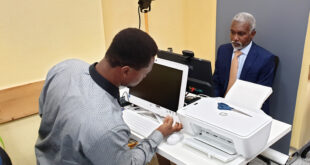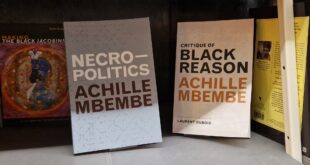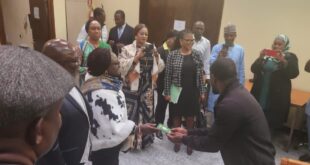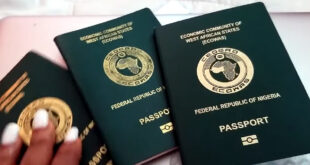Superstition, defined as “irrational belief usually founded on ignorance or fear and characterized by obsessive reverence for omens, charms, etc”, is a phenomenon that is as old as humanity and it occurs in all cultures.
Normal natural phenomena such as thunders and heavy rains used to be interpreted as the result of the actions of gods.
With the increasing influence and impact of scientists, who have explained these phenomena as the result of the interaction of natural forces, man has become more rational in its view of life.
The culture of scientific research has produced the great technological achievements of our age including space travels, laser instruments, artificial intelligence but also products that have enriched our daily lives. We can no longer imagine life without the mobile phone, car, air travel or the internet.
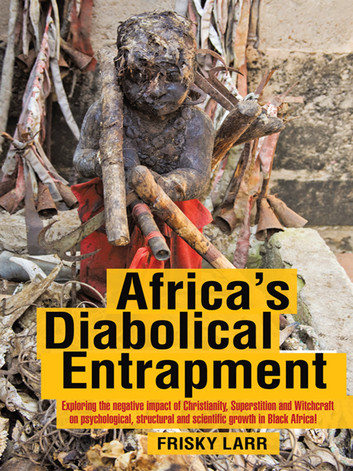
Frisky Larr’s Africa’s Diabolical Entrapment explores the role of belief systems in the continent. The book shows how societies across the world have moved forward in reducing the role of superstition in daily life while Africa seems still entrapped in its hold.
The Germany-based Nigerian author blames this entrapment for Africa’s inability to develop a culture of scientific enquiry. No wonder, he argues, that there are no major products of technological achievement attributable to Africa. Frisky Larr holds our belief systems responsible for the continent’s lagging behind in political and socio-economic development as well.
Even though African traditional religions have largely been replaced by Christianity and Islam, the old belief systems prevail by and large. Africans seem to have simply integrated their old beliefs – in spirits, gods and witchcraft – into the new religions, especially in how they’re practised.
Frisky Larr especially criticises African churches for exploiting this obsession with the spirit world and the many Christian leaders and native priests who promise their followers solutions to their earthly problems but who often fail to deliver.
Normal problems are “spiritualised”. Unemployment is not due to the job seeker’s lack of requisite qualifications or skills and/or experience or even the lack of vacancies because of the state of the economy but the evil action of witches or unseen enemies. Road accidents are not investigated for such probable causes as the technical state of the vehicle or the driver’s mistake or the bad state of the road but must be the outcome of the remote actions of spiritual actors etc.
Personal problems requiring rational analysis and professional counselling are often outsourced to “pastors”, “mallams” or “native doctors”. The result being that people are not encouraged to think deeply about their actions, the environment and society but see all problems as the actions of some spirits, gods and witches and wizards.
Worse still, human beings still go missing in several parts of Africa – killed for ritual purposes. Children labelled as witches get cast out by their own very families. Some are even subjected to horrific violence to make the innocent kids confess and recant their witchcraft. Persons suffering from albinism are hunted for their body parts which some cultures believe hold the key to wealth and power. The list is long. Africa is stuck in a “self-imposed primordial stalemate”.
The author argues that until Africa breaks out of its “religious stupefaction”, it will not be able to realise its development potential and will continue to be at the lowest level of the global technological hierarchy.
And this means that Africa will not be able to eradicate poverty and ensure an abundant life for its peoples despite the continent’s immense natural wealth.
Frisky Larr calls for the rigorous promotion of science education to create a culture of rational thinking in Africa. Only then will the continent be able to break its “diabolical entrapment”.
I find the argument of the author sound but disagree with the book’s subtitle, Exploring the negative impact of Christianity, Superstition and Witchcraft on psychological, structural and scientific growth in Africa. What he accuses Christianity of applies as well to Islamic practices in Africa. While we talk of “pastors” among Christians, Muslims also have their “mallams” or “alfas” or “marabouts”. A subsequent edition of the book should reflect that fact.
It would also be helpful for his message if Frisky Larr makes it unmistakably clear that he is not against religion. No believer needs or has to prove the existence of God.
Africa’s Diabolical Entrapment is an original intellectual work and it dwells on an issue that deserves more popular and scholarly attention by Africans.
Femi Awoniyi
 THE AFRICAN COURIER. Reporting Africa and its Diaspora! The African Courier is an international magazine published in Germany to report on Africa and the Diaspora African experience. The first issue of the bimonthly magazine appeared on the newsstands on 15 February 1998. The African Courier is a communication forum for European-African political, economic and cultural exchanges, and a voice for Africa in Europe.
THE AFRICAN COURIER. Reporting Africa and its Diaspora! The African Courier is an international magazine published in Germany to report on Africa and the Diaspora African experience. The first issue of the bimonthly magazine appeared on the newsstands on 15 February 1998. The African Courier is a communication forum for European-African political, economic and cultural exchanges, and a voice for Africa in Europe.



















